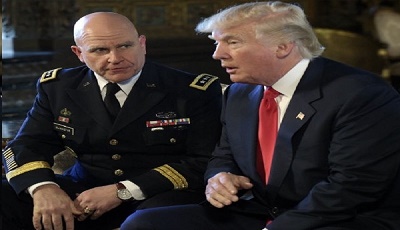Russia intelligence leaks aim at Donald Trump, but wound America: James Robbins
President Trump’s national security advisor H.R. McMaster said Tuesday that “our national security has been put at risk by those violating confidentiality and those releasing information to the press,” which puts Americans at risk. He has a point.

Lieutenant General McMaster was responding to an imbroglio that began with Trump’s meeting last week with Russia’s Foreign Minister Sergei Lavrov and Ambassador to the U.S. Sergey Kislyak. This in itself — a publicly announced meeting between the chief executive and high ranking Russian officials — seems to qualify as a controversy in some quarters, since the self-styled resistance is in the midst of the biggest anti-Russian hysteria since the McCarthy era. During the meeting, Trump discussed an Islamic State plot to use weaponized laptop computers to bring down commercial aircraft traveling from the Mideast and Europe. Days later The Washington Post printed a breathless article about President Trump’s supposedly “reckless” intelligence disclosures.
Note that the article said that it was “unlikely that his disclosures broke the law.” As well, it is the stated policy of the United States to work with Russia against common threats like ISIS. This was also the policy of the Obama administration, which The Washington Post reported in 2016. The laptop-bomb plot has been widely known for some time. In March, the U.S. and the United Kingdom banned passengers departing from ten Middle Eastern airports from carrying laptops and other larger electronic devices. Last week, the Department of Homeland Security confirmed that the ban might be extended to countries in Europe as well. As The New York Times reported, “The ban was put in place after intelligence showed that the Islamic State was developing a bomb that could be hidden in portable electronic devices.”
So why the ruckus? The key bit of information that one Post source — “a former senior U.S. counterterrorism official who also worked closely with members of the Trump national security team” — found most offensive was revealing the city where the bomb-making is taking place. “The idea of sharing it at this level of granularity with the Russians is troubling,” the source said. The Post did not reveal the name of the location, but presumably ISIS already knows where it is. So, if anyone was placing sources and methods in danger it was the anonymous intelligence official who put a neon sign on the key bit of information that ISIS should be paying attention to. Good job.
On Tuesday, The New York Times added to the mess by reporting that Israel was the source of the information about the laptop plot. There is no way to know if this is true because the Times article, like the Post article, quotes anonymous sources and offers no other form of evidence. The most compelling reason to believe the story is that the president is about to travel to Israel, so whoever was behind the article can be assumed to be stirring up trouble prior to the official visit. As the Times noted, “the revelation adds a potential diplomatic complication to the episode.” However, Trump has nothing to do with leaking this bit of sensitive national security information; it is totally on the head of the anonymous sources, who committed a felony in the process.
Whether you blame these leaks on the denizens of the deep state or the shallow reporters who work with them, it is clear that some people are in the wrong line of work. Those who feel that it is their duty to criminally reveal secret information in the interests of hobbling the president should reexamine their priorities and their commitment to public service. The country would be better off without them. As for reporters, a poll by Emerson College in February showed that more people trust the president than the press. And Gallup says that regard for the media is at an new low. Rather than doubling-down on their bitter anti-Trump narrative, reporters might ask themselves if they are more committed to reporting news, or creating needless and dangerous controversy.

James S. Robbins, a member of USA TODAY’s Board of Contributors, has taught at the National Defense University and the Marine Corps University and served as a special assistant to the secretary of defense in the George W. Bush administration. He is author of This Time We Win: Revisiting the Tet Offensive.


